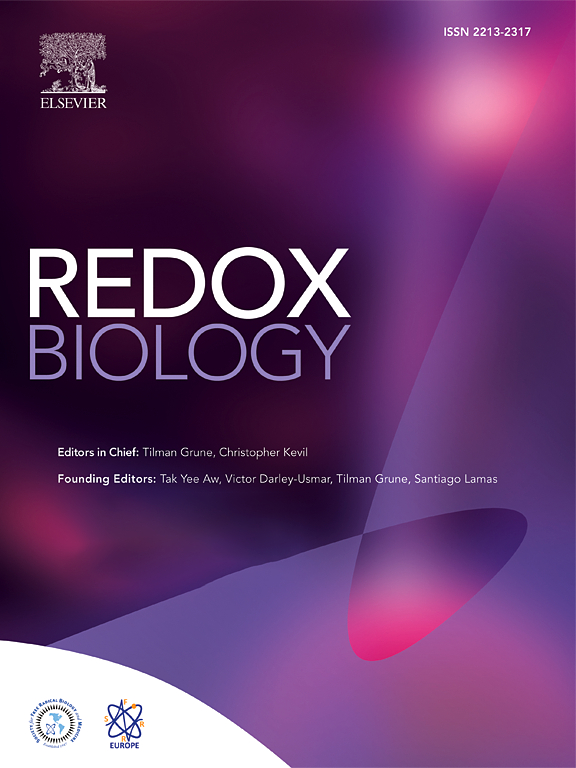High-dose vitamin C as a targeted treatment for KRAS-driven cancers?
IF 10.7
1区 生物学
Q1 BIOCHEMISTRY & MOLECULAR BIOLOGY
引用次数: 0
Abstract
KRAS mutations are frequently observed in human cancer and are associated with proliferation, therapy-resistance and worse outcome. Regrettably, only a fraction of possible mutations is druggable. Therefore, a tailored and possibly cost-effective method to overcome this issue is urgently needed.
Recently, Bodeker et al. presented a randomized phase II trial investigating whether high-dose vitamin C (ascorbate) improved overall survival in metastatic pancreatic cancer (Bodeker et al., Redox Biol 2024). This may be due to the high frequency of KRAS mutations in pancreatic cancer (>90 %), as, in the case of oncogenic RAS, high-dose vitamin C becomes synthetic lethal when added to chemotherapy, as previously shown by the work of Cantley and coworkers (Yun et al., Science, 2015)
It is unclear, however, if this observation holds true also for rare KRAS mutations. Recently we treated a 43 year old male patient with metastatic duodenal cancer and an atypical KRAS mutation A59T using FOLFOX-chemotherapy with high-dose vitamin C as second line therapy. The tumor had progressed after first line immune checkpoint therapy as the tumor presented with microsatellite instability. Restaging after 8 cycles of FOLFOX + high-dose vitamin C therapy revealed regression of the tumor mass and extensive tumor necrosis. Thus, our personalized experimental approach yielded in a greater clinical benefit for the patient than the previous standard therapy, particularly a PFS-2/PFS-1 ratio of >2.
Obviously we do not know whether this response could have also been observed if chemotherapy was given w/o high-dose vitamin C. As up to now two randomized clinical trials showed a beneficial effect of the addition of high-dose vitamin C (pancreatic cancer: Bodeker et al., colorectal cancer: Vitality trial), and, in the case of Vitality, the benefit was restricted to KRAS mutated tumors only, more clinical trials addressing this topic are needed. Therefore, we thank Bodeker et al. for contributing these important data.
高剂量维生素C作为kras驱动的癌症的靶向治疗?
KRAS突变在人类癌症中经常被观察到,并且与增殖、治疗抵抗和更糟糕的结果相关。遗憾的是,只有一小部分可能的突变是可以药物治疗的。因此,迫切需要一种量身定制且可能具有成本效益的方法来克服这一问题。
本文章由计算机程序翻译,如有差异,请以英文原文为准。
求助全文
约1分钟内获得全文
求助全文
来源期刊

Redox Biology
BIOCHEMISTRY & MOLECULAR BIOLOGY-
CiteScore
19.90
自引率
3.50%
发文量
318
审稿时长
25 days
期刊介绍:
Redox Biology is the official journal of the Society for Redox Biology and Medicine and the Society for Free Radical Research-Europe. It is also affiliated with the International Society for Free Radical Research (SFRRI). This journal serves as a platform for publishing pioneering research, innovative methods, and comprehensive review articles in the field of redox biology, encompassing both health and disease.
Redox Biology welcomes various forms of contributions, including research articles (short or full communications), methods, mini-reviews, and commentaries. Through its diverse range of published content, Redox Biology aims to foster advancements and insights in the understanding of redox biology and its implications.
 求助内容:
求助内容: 应助结果提醒方式:
应助结果提醒方式:


